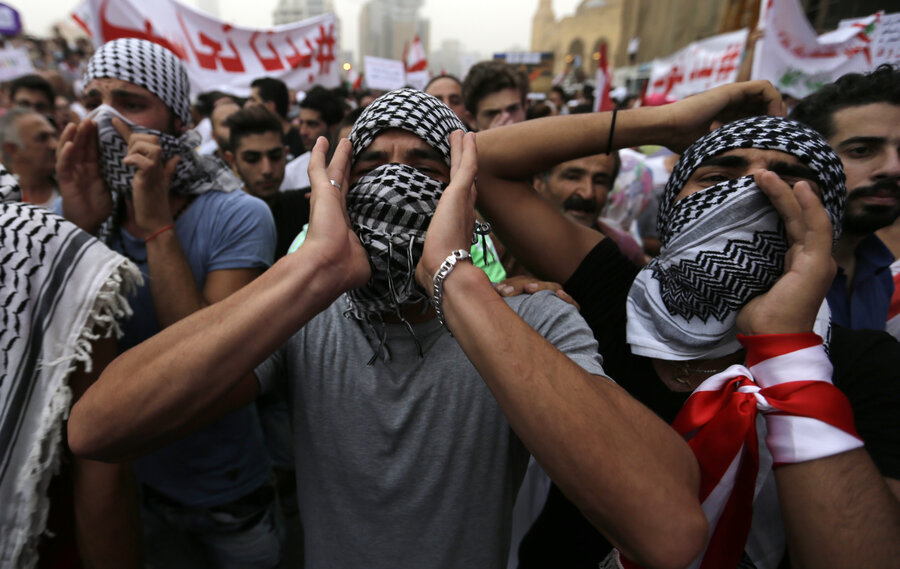Lebanese anti-government protests resume as leaders debate trash crisis
Loading...
| BEIRUT
Thousands of Lebanese demonstrators braved a sandstorm and oppressive humidity to take to Beirut streets on Wednesday and rally against government dysfunction, as politicians met for the first round of talks aimed at averting a political crisis that stemmed from a trash crisis that has engulfed the country's capital.
Activists near the parliament building, which was closed off by security forces, shouted "thieves!" and hurled eggs as politicians' convoys drove by.
Tensions rose further after a morning gathering of lawmakers and senior politicians ended without results, while the Cabinet convened late into the night to discuss the deadlock. Outside the government building, protesters chanted: "Revolution, revolution against the system."
Just before midnight, the government said it had approved a plan that promises to end the trash crisis.
"They are feeling the sand shifting under them," Elias Nassour, a 28-year-old protester, said of the government leaders. "Nothing will pass so easily anymore. They can't belittle us anymore."
The trash crisis has ignited the largest Lebanese protests in years and has emerged as a festering symbol of the government's paralysis and failure to provide basic services. It was sparked by popular anger over the heaps of trash accumulating in Beirut's streets after authorities closed the capital's main landfill on July 17 and failed to provide an alternative.
The protests quickly moved beyond just the trash in the streets to target an entire political class that has dominated the country and undermined its growth since the civil war ended in 1990. Lebanon has a confessional power-sharing system that often leads to incessant bickering and cronyism among the country's politicians.
Thousands of people have taken part in huge demonstrations over the past two weeks. Among other things, they are demanding new parliament elections, to be followed by presidential elections.
The country has been without a president for over a year, and members of parliament have illegally extended their term twice amid disputes over an election law.
After meeting for three and a half hours, leaders of Lebanon's various sectarian blocs issued a brief statement, saying the talks would resume in a week.
"They did not even bother to meet tomorrow or the day after, they postponed it for a week and came out without any decision," said Assaad Thebian, an organizer with the main group behind the protests, which calls itself "You Stink."
"They showed that they are indifferent and should not be in leadership positions," he told The Associated Press.
"This dialogue is a joke. They are meeting to see how they can split the cheese," said Marwan Basha, a 57-year-old engineer taking part in the sit-in near parliament, as riot police stood nearby. His T-shirt had Arabic words on the front, asking: "Where is the water, where is the electricity, where are the job opportunities?"
On the barbed wire that separates protesters from the building, activists pinned a large banner with the pictures of the 128 members of parliament reading: "You have failed at everything ... Go Home."
So far, the only response to the growing protest movement has been a promise by the parliament speaker, Nabih Berri, for the high-level talks among the politicians.
His call has been backed by the main political leaders, who attended the meeting Wednesday, but it was unclear how such talks among the same veteran politicians being vilified by the protesters would help break the deadlock.
The leaders are deeply divided over core issues, such as what a new election law would look like, and whether it should be passed before or after a president is elected.
Following the meeting, a government official said they discussed the urgent need to elect a president. Adnan Daher said the next dialogue session would be held on Sept. 16.
At Beirut's main Martyrs' Square, thousands waved red-and-white Lebanese flags and chanted anti-government slogans as night fell.
"The people want to topple the regime," many shouted — a chant common during the Arab Spring uprisings in 2011.
Ahmad Amhaz, a 23-year-old activist who is among eight who have been on a hunger strike for days, called for the resignation of the environment minister.
"This dialogue is a failure. If they agree, we starve and if they disagree we get killed," he said. His flip-flops were plastered with photographs of Lebanese politicians.
Earlier on Wednesday, 61-year-old Albert Aswad who owns a printing house, brought more than two dozen eggs and a bag of tomatoes and hurled them at the politicians' convoys as they passed by on the way to their meeting. "Politicians in this country have no morals," he said.
Just before the morning meeting, Prime Minister Tammam Salam urged the politicians to make every effort to help end the paralysis. He then called for a Cabinet meeting.
"I hope at the Cabinet meeting today ... there will be an immediate solution to rid the country of garbage as a way to propagate trust in the country," Salam told journalists.
After nearly six hours of Cabinet meeting, and shortly before midnight, minister of Agriculture Akram Chehayeb said a plan has been approved to remove trash from the streets, open new landfills and allow municipalities to manage the portfolio previously handled by the government.
Details of implementation are still unclear, but the plan meets some of the protesters demands, such as passing the trash handling to the municipalities level.
Associated Press Writer Sarah El Deeb contributed to this report from Beirut.







